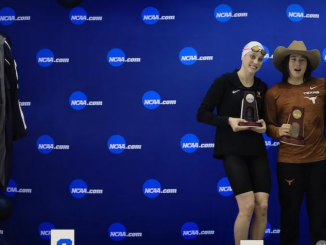
After much public discussion on whether swimmer Lia Thomas, who is transgender, should compete in women’s events, the NCAA met on Wednesday and announced that there would be changes to its policies regarding transgender athletes.
These changes could mean Lia Thomas, part of the Penn Athletics women’s swimming team, will not be able to compete in the upcoming NCAA Championships.
Under the former policy, trans women were allowed to compete in women’s events if they had undergone a year of hormone-suppression therapy. The new policy means they have to follow the rules of the national and international governing bodies – which require a certain testosterone level.
The changes were not accompanied by new medical or legal evidence. It is unclear as to whether Ms Thomas would be able to prove these testosterone levels. The Independent has contacted Ms Thomas for comment.
The new policy has sparked anger among sports fans who feel the NCAA is simply “passing the buck”.
“Rather than working diligently to create a comprehensive and sensible policy … pass the buck to each individual #sport governing body,” said sports coach Linda Blade on Twitter after the news.
“The NCAA has simply passed the buck, ignoring that there is a lot more to this issue than testosterone levels,” commented another Twitter user.
The College Swimming and Diving Coaches Association of America had said it is “disappointed” with the NCAA.Penn Athletics told The Independent that it will support its student Lia Thomas and will “work with the NCAA regarding her participation under the newly adopted standards for the 2022 NCAA Swimming and Diving Championships”.
“Approximately 80 per of US Olympians are either current or former college athletes,” said NCAA President Mark Emmert said in a press release. “This policy alignment provides consistency and further strengthens the relationship between college sports and the US Olympics.”
Lia Thomas started smashing women’s swimming records this year. She was on the men’s swimming team for three years previously, but after transitioning she joined the women’s team.
The previous NCAA 2011 policy, which has now been scrapped, stated that it would “ensure transgender student-athletes fair, respectful, and legal access to collegiate sports teams based on current medical and legal knowledge”.
The new policy states that there will be “a sport-by-sport approach to transgender participation that preserves the opportunity for transgender student-athletes while balancing fairness, inclusion and safety for all who compete.”
*story by The Independent


